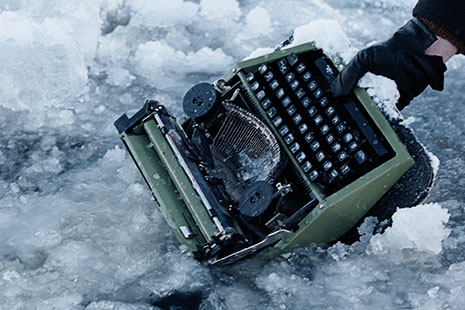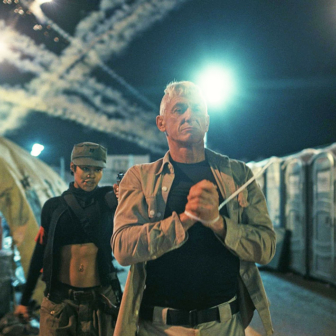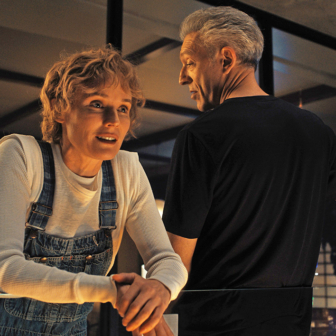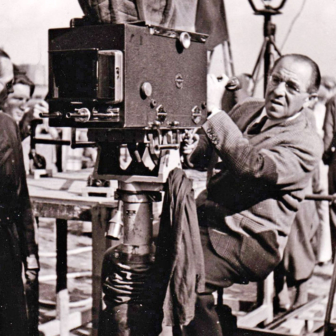ALLEGORICAL paths are tempting; what can we read about contemporary Russia from the bleak and beautiful poetry of Silent Souls, currently playing? Two things at least: that it still sustains a film-cultural climate in which rigorous and demanding cinematic poetry is possible; and that remote, disappearing folk traditions, sustained in impoverished regions, can be acknowledged, accorded their validity. Behind all that there is a history of immeasurable loss; here a tale of personal bereavement figures the disappearance of a whole world, a whole people’s history. The film is short (seventy-seven minutes), dense, lucid, and perfect in its own terms.
There are affinities with last year’s austere and masterly How I Ended This Summer, though that’s a much more spacious film. This one, directed by Aleksei Fedorchenko and written by Denis Osokin, also follows two men in a cold landscape; no polar bears or radioactive fish, but two lively caged birds – buntings, like big sparrows – travel in the car with the men and, for most of the trip, the corpse of a dead young wife, Tanya (Yuliya Aug). The three belong to a vanishing, isolated Finnish minority, the Merja, and the journey has a purpose, to cremate the young woman’s body according to Merja traditions, while her widower Miron (Yuriy Tsuirilo), also in line with his traditions, speaks to his friend about his love and lust for her; this is a recognised practice after a spouse’s death, and they call it “smoking.” Aist, the narrator (Igor Sergeyev), has other burdens in his memories of a father who wrote poetry, and of times they once shared rowing on the Volga. All the way the birds are chirping, fussing, dancing inside the cage; this isn’t the first Russian film in which escaping birds symbolise both the will to freedom and the departure of the soul.
The men reach a shore of the vast river, and build the bier from a load of timbers we have seen them buying on the way. This process is recounted, almost ethnographically; we have also seen the washing of the body, the careful combing out of long red-brown hair. The film is made of such precise details, deliberate observances, in which the men act out their acceptance of where they belong in their world and what they must do. In the wordless spaces as they go through the process, another story is present though almost unseen, and tentatively offered for decipherment: Tanya’s story. It can be read in different ways, and your way may not be mine.
IN THE past ten days I’ve seen two Australian fiction-films about family and couples. One is good, the other very good indeed. The former is the highly praised melodrama Wish You Were Here (honours at Sundance), written and directed by Kieran Darcy-Smith and co-written by Felicity Price, who also has the central role of Alice. She, her husband Dave and sister Steph (Teresa Palmer) have returned from a hectic week of holiday in Cambodia; their friend Jeremy (Anthony Starr), who came with them, has gone missing. His disappearance is pivotal to the drama at first, but fades into the background as crucial tensions open among the other three. Dave is at the centre, and Joel Edgerton superbly communicates his desperate struggle to live with his guilts and secrets while sustaining an overcrowded, raucous domestic and professional life – he and Alice have two young children, with a third on the way. He designs pleasure-boats, and the business is holding up despite the GFC. That fact is tossed off in casual talk, and it’s part of the film’s insistent, rushing contemporaneity: “we’ll just hang by the pool”; “catch you in fifteen”; and Steph is never called Stephanie.
The everyday chaos round the kids is vividly rendered, by them and others, in Jules O’Loughlin’s cinematography and Jason Ballantine’s rhythmic, kaleidoscopic editing. Each fragment of drama occupies minimal screen time for maximal effect; the realism is highly detailed, down to the fine wrangling of airport sniffer dogs and drug searches. But in the outcome, there’s less than meets the eye. A critique of Sydney materialism (allegedly worse than that of other cities, but I’m not so sure) is hinted at; Alice drives a glossy red Saab, and the flat, or house, overlooks Tamarama beach. It’s not enough for seriousness; the central story is the same old. The great Spanish-Mexican modernist Luis Buñuel (1900–83) once said that for cinema “the bourgeois adulterous drama” was over, out of date; and so it should be.
The other film was Stephen Wallace’s Love Letters from Teralba Road (1977). It was screened in a retrospective, Outsiders in Australian Cinema, currently at the Art Gallery of New South Wales. Love Letters, written by Wallace from real letters found in a flat, negotiates the dynamics between sexual love and compulsive violence in the relationship between industrial worker Len (Bryan Brown) and his wife Barbara (Kris McQuade). Barbara has given up on Len and gone home to her family in outer-suburban Sydney, where she shares a cramped bedroom with her sister, played by a very young Gia Carides; the letters, in which Len finds a different, pleading voice, are part of his struggle to win her back. The dialogue is finely tuned, the performances insightful and absolutely convincing; a working-class milieu is not observed so much as created and inhabited. No triangles here; the conflict is built of clashing needs between two people, and neither of them can help it. Across more than three decades, I had remembered this film’s settings, its probing of everyday, irresolvable conflicts; Len’s mum in her kitchen, Barbara mulling over things with her friend Norma, the sunlit final sequence in which the capering child plays with water around the Hills Hoist. A mere fifty minutes of fully believable life, and not one of them wasted. This film was funded by the once-upon-a-time, and still lamented, Sydney Filmmakers’ Co-operative.
The Art Gallery series has included other such small masterpieces as Ivan Sen’s Wind and Tracey Moffatt’s Night Cries; other films still to come (Sundays and Wednesdays) include Jane Campion’s Sweetie, Glenda Hambly’s Fran, Ray Argall’s superb Return Home, and David Michôd’s Animal Kingdom. •





